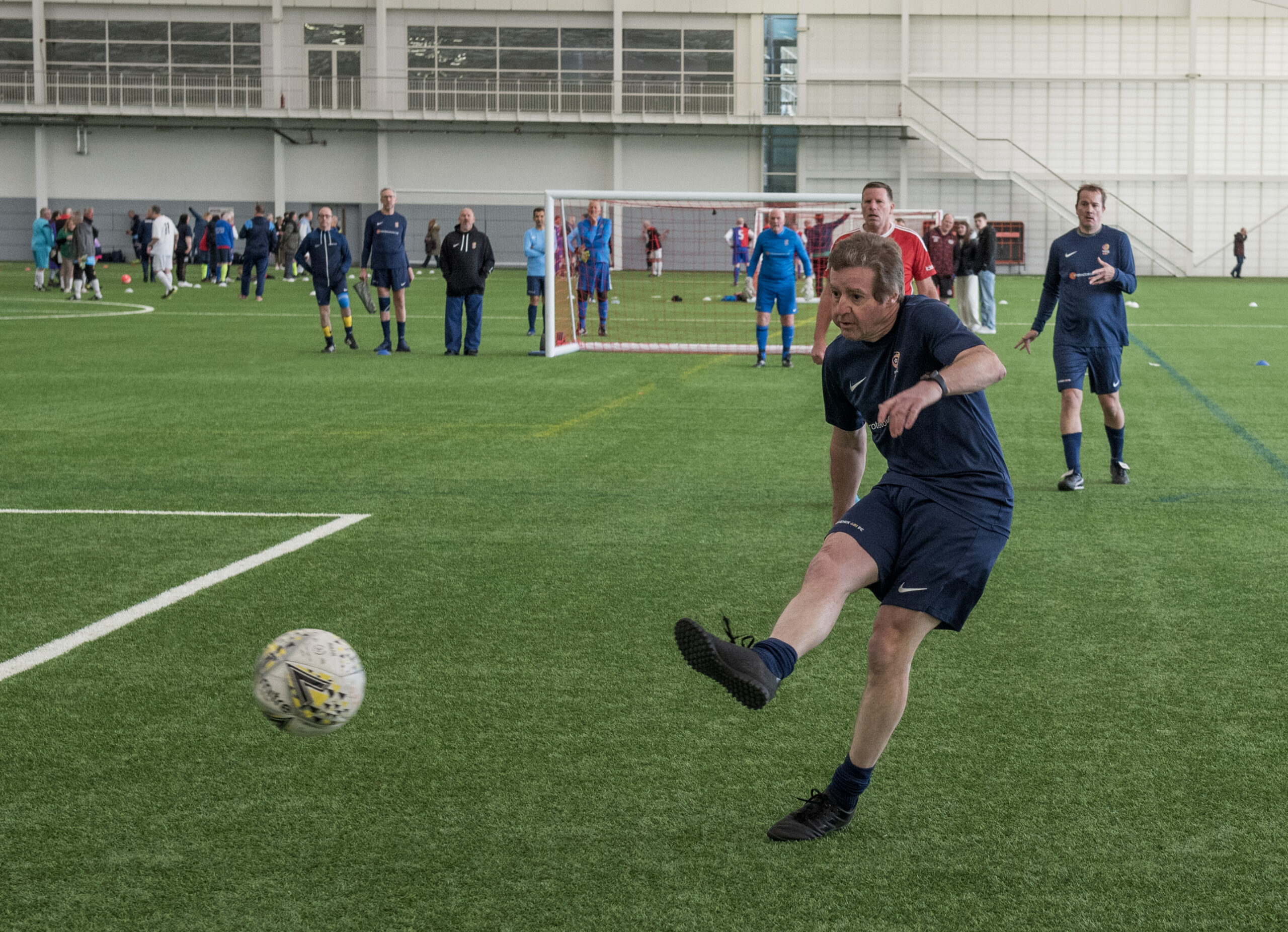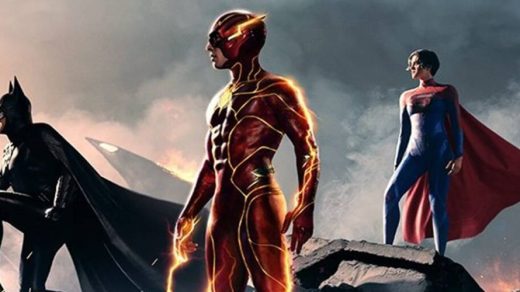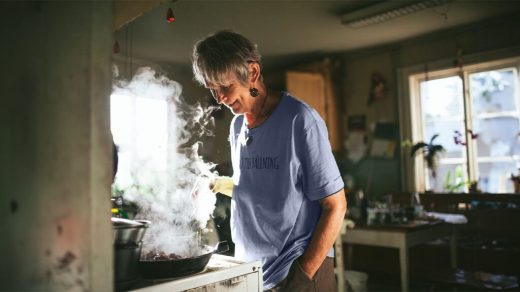“You have Parkinson’s Disease.”
Four words that changed Garen Williams’ life when he was just 45 years old.
“I thought I’d never play football again,” he tells me during our video call from his home in South Wales.
Eight years later, however, the co-founder of Sport Parkinson’s proudly professes to be playing the best football of his life. He’s travelled the world with the game, representing both England and his beloved Cardiff City.
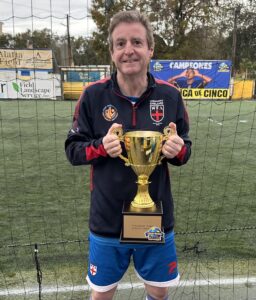
Parkinson’s disease is the fastest-growing neurological condition in the world. Caused by the loss of dopamine-producing cells, it gradually disrupts the brain’s ability to control movement, provoking symptoms including tremors, stiffness, and slowed movement.
While there is currently no cure, regular exercise remains one of the few proven ways to slow the progression of the disease, and relieve its symptoms.
As Garen says: “I completely forget about my Parkinson’s when I play football. It’s probably the only time I ever actually shut off from thinking about it.
“I feel free. I’m able to move. I’m able to do things that I wouldn’t normally be able to do.”
For him, football is more than a game – it’s a lifeline. A Cardiff City season ticket holder since 1985, the sport has been a constant source of joy. But since his diagnosis in 2017, it has become so much more.
“It’s something I love – a happy and safe place for me,” he says with a smile.
“Parkinson’s is a very difficult thing to deal with. Just getting ready to go out can be stressful. But once I’m on the pitch, I forget about the stress. It’s like the brain switches off, and I stop thinking about my condition.”
“Don’t let it defeat you”
Sir Nicholas Mostyn, a former High Court judge and divorce barrister, whose clients include Princess Diana and Paul McCartney, was diagnosed with Parkinson’s in 2020.
Last week he took part in an intensive two-day windsurfing session in Weymouth – the 2012 Olympic venue – training with former UK freestyle champion, Simon Bornhoft.
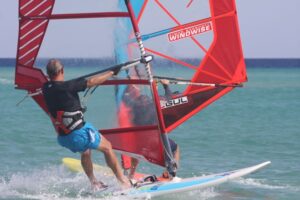
The last time Sir Nicholas tried the sport was in February 2020.
“I was not functioning at all well, I had a really bad tremor,” he tells the Sports Gazette.
“I’d been googling away, and I thought, this isn’t looking good at all. I just couldn’t get windsurfing at all. There were too many moving parts, too much to think about, too much strength that was needed – and I was feeling really rubbish.
“I got back, and eventually got the neurologist to send me for a scan. About two months after that, during lockdown, I was diagnosed.”
Speaking five years post-diagnosis, and taking on the challenge again, alongside Jerry Collier, a retired consultant surgeon diagnosed with Parkinson’s in 2012, Sir Nicholas said: “He and I are going to take the disease on together. It’s all part of the campaign – don’t let it grind you down, don’t let it defeat you.”
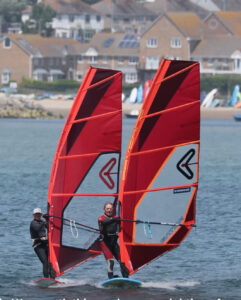
A lifeline
Sir Nicholas is an avid sportsman. Apart from windsurfing, he is a passionate tennis player and golfer, regularly goes cross-country horse riding, and has recently been enjoying deep powder skiing in Canada.
“There is no doubt that exercise, for reasons which are obscure, does as much to keep my symptoms at bay as the drugs,” he says.
“Nobody tells you that when you go and hear the fateful words, ‘You’ve got Parkinson’s,’ from the neurologist. He doesn’t say, ‘By the way, sign up with a personal trainer.’
“That’s what surprised me most: when I was diagnosed, I was not told about the merits of exercise – I had to work that out for myself.”

Garen Williams, too, has experienced the transformative power of sport on his Parkinson’s symptoms. His diagnosis had come as a complete shock.
“I really wasn’t prepared for it,” Garen shares. “I didn’t know much about it at that stage – all I knew was that people shake.
“I didn’t know anybody with Parkinson’s. I did my own research, which basically frightened me, because the drugs you’re on are very, very powerful.”
At first, Garen feared the diagnosis meant giving up football, the game he loved. But he later discovered it would be the very thing that saved him.
“Parkinson’s is very difficult to control,” Garen explains. “If I don’t medicate, I can freeze, or move like a robot.
“It might take me 10 minutes just to put my socks on and get ready to leave the house, but then I can walk across the road to the football pitch and start running.”
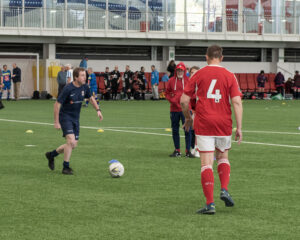
Why does exercise help?
Research shows that exercise not only eases Parkinson’s symptoms, but may also help slow the progression of the disease.
The Sports Gazette spoke to Sir Nicholas Mostyn’s personal trainer, Luis Díaz, who explains: “Exercise helps create hormones and improves the sensitivity of the hormones in the brain.
“With exercise, you stimulate the creation of neural pathways called brain-derived neurotrophic factor. It helps you to maintain the neurons you already have, create new ones, as well as creating new paths between the neurons and muscles.”
Luis holds a degree in Sports Science and Physical Activity from Universidade da Coruña in Spain. While studying, he collaborated with a professor researching Parkinson’s and exercise – knowledge that has proved invaluable in his work with Sir Nicholas, whom he had already been training for several years prior to the diagnosis.
“After Nick was diagnosed, we prioritised the exercise he was already doing, increasing his sessions from once a week to at least twice a week,” Luis says.
He also emphasised the importance of variety, encouraging Sir Nicholas to continue with tennis, horse riding, golf and skiing.
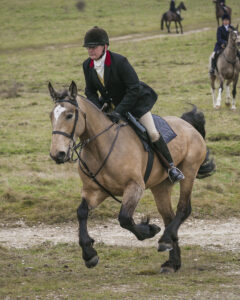
The benefits have been clear.
“I would say that Nick is in a better shape now than when he was diagnosed,” Luis says. “He’s way more flexible now – even though, with Parkinson’s and age, you’d expect the opposite.
“One of his biggest challenges with Parkinson’s is sleep, so we focus on that too, with breathing techniques and having a good routine.
“He really takes it seriously, so we’re reaching his potential and doing as much as he can, which is great”
Luis has also observed significant improvements in Sir Nicholas’ aerobic endurance and core strength – noting that he can hold a five-minute plank while talking.
To others living with Parkinson’s, Luis says: “Keep doing what you’re already doing – any exercise is beneficial. It could be carrying groceries, going for a walk, going to the supermarket, or riding a bicycle.
“You don’t need to make big changes; any physical activity you can incorporate into your life will help maintain or even improve fitness levels, and slow the progression of the disease.
“Even five minutes of stretching can make a big difference in the long-term.”
Of course, it is not only physical health that makes exercise and sport so valuable for people with Parkinson’s. Just as crucial are the mental health benefits, along with the sense of community that can be created, offering connection, support, and shared experience.
For Sir Nicholas, in particular, it’s the competition.
“I am a competitive person,” he says. “I was highly competitive in my work. I did my cases on a pretty competitive basis – I would always think of them in terms of winning and losing.
“I think sport, in its competitive nature, is very good for your mental health, because competition is something that keeps your mind active.”
Sport Parkinson’s
Founded by Garen Williams and Charlie Appleyard, Sport Parkinson’s is an organisation dedicated to helping people with Parkinson’s stay active and socially connected through sport.
For Garen, it all started in 2019, when a Facebook post caught his eye. It was about the Ray Kennedy Cup – an international football tournament for people with Parkinson’s.
“I rang the organiser for Team Great Britain, Charlie Appleyard, and he said to me, ‘You’re in the team.’”
What followed was a whirlwind, with £40,000 raised for Cure Parkinson’s, a penalty scored live on Soccer AM, and then a flight to Copenhagen to represent his country as part of the United Kingdom Young Onset Parkinson’s Disease Football Club (UKYOPD FC).
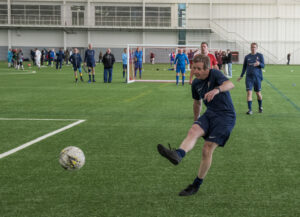
“We did training and fitness routines, but the real benefit was the social side – the interaction, being around people who were going through the same thing as me.”
While the team narrowly missed out in the semi-final, a bigger idea had been germinated.
Upon their return home, Garen and Charlie founded Sport Parkinson’s, and since then, the organisation has raised £361,000 towards finding a cure. They have awarded £29,000 in grants, and welcomed 2,730 participants to their events, which range from walking football tournaments and golf days, to Try-Athlons, offering people with Parkinson’s the opportunity to try a range of activities and sports.
“There are three things that kill people with Parkinson’s – boredom, inactivity, and isolation. If we can break that cycle, we give people their life back,” Garen declares, brimming with passion.
“People with Parkinson’s suffer from anxiety, and they tend to shut themselves away and not go out,” he continues. “Gyms can be lonely places, especially if you’re on your own. But team sports generate togetherness.
“I see it on a weekly basis – new people who’ve been diagnosed with Parkinson’s turn up to training.
“Maybe they fall over on the first day. But within a couple of weeks, they’re passing the ball, defending, moving more confidently. The transformation is unbelievable.”
Silver linings
Since his diagnosis in 2020, Sir Nicholas Mostyn has launched the King’s Parkinson’s Charitable Fund with Professor Ray Chaudhuri.
As well as co-presenting Law & Disorder, a podcast which looks at big news issues through the eyes of the law, he is a co-presenter on the hugely popular Movers & Shakers, a podcast in which six friends discuss the realities of life with Parkinson’s.
“If I hadn’t been diagnosed with Parkinson’s,” Sir Nicholas says, “there wouldn’t have been this podcast, because it was my idea. The podcast would not have happened, and I wouldn’t have met this whole world of people.
“So, although you wouldn’t wish Parkinson’s on your worst enemy, the fact is, there are some dividends to it: I’ve made some very good friends amongst the Movers & Shakers.
“Parkinson’s knows no hierarchy, it knows no cost, and so you meet people from all walks of life, which I wouldn’t have done otherwise.”
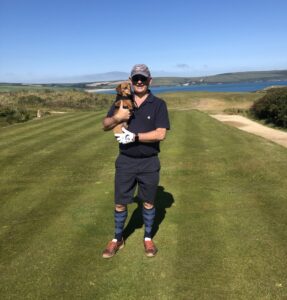
A Parkinson’s diagnosis might change what’s possible – but it doesn’t end possibility altogether.
In April, 24 teams from around the world gathered at St George’s Park for the world’s largest walking football tournament for people with the condition. This was organised by Sport Parkinson’s. This Sunday, 22 June, they will host their annual Try-Athlon at Twickenham Stoop Stadium, home of the Harlequins rugby union team.
“For people to get the opportunity to play in such an iconic venue is something really special,” Garen says. “To create memories in front of their family and friends.
“To show everyone: I may have Parkinson’s, but I can still do this.”
